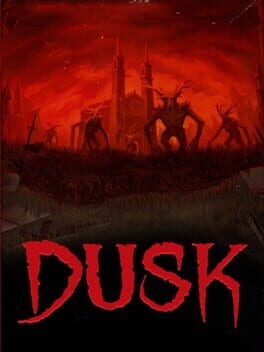DUSK is the Uncharted 2 of Quake-likes.
As the enchanting low-poly video game locales give way to demonic machinery, Escheresque mansions, extraplanar cultic horrors, and what I can only describe as a tribute to Minecraft's "The Dropper", DUSK comes to resemble an endearing action-horror parody of itself. The imaginative and increasingly elaborate set pieces bring to mind modern blockbusters. Contrary to my expectations going in, DUSK did not make me yearn for an earlier time in game development history, but rather led me to contemplate how far the medium has come in terms of conveying a sense of place.
DUSK is purportedly a spiritual sequel to the first Quake, and we see this reflected in its visual design and themes. A common praise given to Quake is that it has "good atmosphere" apropos of its charming earth-tone graphics and ambient sound design. I implore those who espouse this to describe to me a single location in that game in concrete terms and without using the word "Lovecraftian." Describe to me what a given level is supposed to be, where you the character are occupying, without referring to the name on the level telling you what it is supposed to be. What I am getting at is: Quake has no sense of place. It is DOOM's abstract representation of Hell, but in 3D and brown. Quake is closer to a video game tone poem about Lovecraftian horror than anything resembling a horror story, and DUSK is the perfect counterpoint to make this case.
I was surprised to learn that David Szymanski's least favorite id Software game is Quake II, when I found DUSK to be FAR more similar to that game. I love them for very similar reasons: the world, the atmosphere, the singular looming threat that the protagonist vies against. Anyway, great game, go play it.
As the enchanting low-poly video game locales give way to demonic machinery, Escheresque mansions, extraplanar cultic horrors, and what I can only describe as a tribute to Minecraft's "The Dropper", DUSK comes to resemble an endearing action-horror parody of itself. The imaginative and increasingly elaborate set pieces bring to mind modern blockbusters. Contrary to my expectations going in, DUSK did not make me yearn for an earlier time in game development history, but rather led me to contemplate how far the medium has come in terms of conveying a sense of place.
DUSK is purportedly a spiritual sequel to the first Quake, and we see this reflected in its visual design and themes. A common praise given to Quake is that it has "good atmosphere" apropos of its charming earth-tone graphics and ambient sound design. I implore those who espouse this to describe to me a single location in that game in concrete terms and without using the word "Lovecraftian." Describe to me what a given level is supposed to be, where you the character are occupying, without referring to the name on the level telling you what it is supposed to be. What I am getting at is: Quake has no sense of place. It is DOOM's abstract representation of Hell, but in 3D and brown. Quake is closer to a video game tone poem about Lovecraftian horror than anything resembling a horror story, and DUSK is the perfect counterpoint to make this case.
I was surprised to learn that David Szymanski's least favorite id Software game is Quake II, when I found DUSK to be FAR more similar to that game. I love them for very similar reasons: the world, the atmosphere, the singular looming threat that the protagonist vies against. Anyway, great game, go play it.
